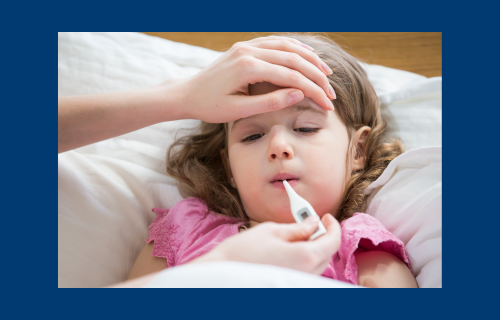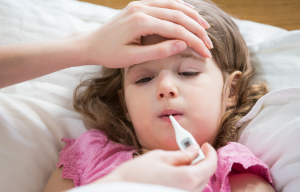A trainee-led study on fever education for caregivers of patients presenting to a PED, shows how simple intervention can empower caregivers and ease healthcare burdens
Friday, 26 January, 2024
Share

Congratulations to (opens in a new window)Prof Michael Barrett (School of Medicine Clinical Professor), Dr Carol Blackburn (School of Medicine Clinical Lecturer/Assistant Professor), Catherine Lynch (School of Medicine Research Nurse Manager) and Maja Kuhar on their published study, ‘Fever education for caregivers in the emergency room (The FEVER study)–an interventional trial’.
This trainee-led study on fever education for caregivers of patients presenting to a Paediatric Emergency Department, shows how simple intervention can empower caregivers and ease healthcare burdens.
 BACKGROUND: Despite the vast majority of fevers representing benign self-limiting illnesses, caregiver anxiety regarding fever is high. Empowering caregivers with knowledge to safely and appropriately manage fever at home has the potential to reduce demands upon healthcare services.
BACKGROUND: Despite the vast majority of fevers representing benign self-limiting illnesses, caregiver anxiety regarding fever is high. Empowering caregivers with knowledge to safely and appropriately manage fever at home has the potential to reduce demands upon healthcare services.
AIM: To improve caregiver knowledge about fever and its management in children via an educational intervention.
METHODS: Caregivers of children over 6 months presenting with fever to a Paediatric Emergency Department were recruited. A pre-intervention survey was completed to ascertain caregiver knowledge about fever and its management. The intervention of (i)an infographic about fever, with (ii) a short video on fever was viewed. A post-intervention survey re-assessed knowledge. The primary outcome was the correct definition of fever as a temperature ≥38°C.
RESULTS: Caregivers (n = 51) who correctly defined fever increased from 41% (n = 21) pre-intervention to 94% (n = 48) post-intervention. There was a reduction in common misconceptions about fever, including a higher fever representing a more serious infection (76% vs. 8%). Caregivers reported they were less likely to seek emergency healthcare due to the height and nature of the fever alone.
CONCLUSIONS: A simple brief educational intervention can rapidly increase caregiver knowledge about fever in children. There is a continuing need for clear, easily-accessible information for caregivers on this topic.
IMPACT:
- Parental knowledge about fever and how to manage it in their children is low.
- A simple brief educational intervention can significantly increase caregiver knowledge about fever.
- A combined written and audiovisual approach is effective and well-received by parents.
- Educating caregivers has the potential to improve the management of childhood fever at home and to reduce the burden on healthcare services, as well as reduce unpleasant hospital visits for children and their caregivers.
For the full paper, please visit nature.com clinical research articles (opens in a new window)here.